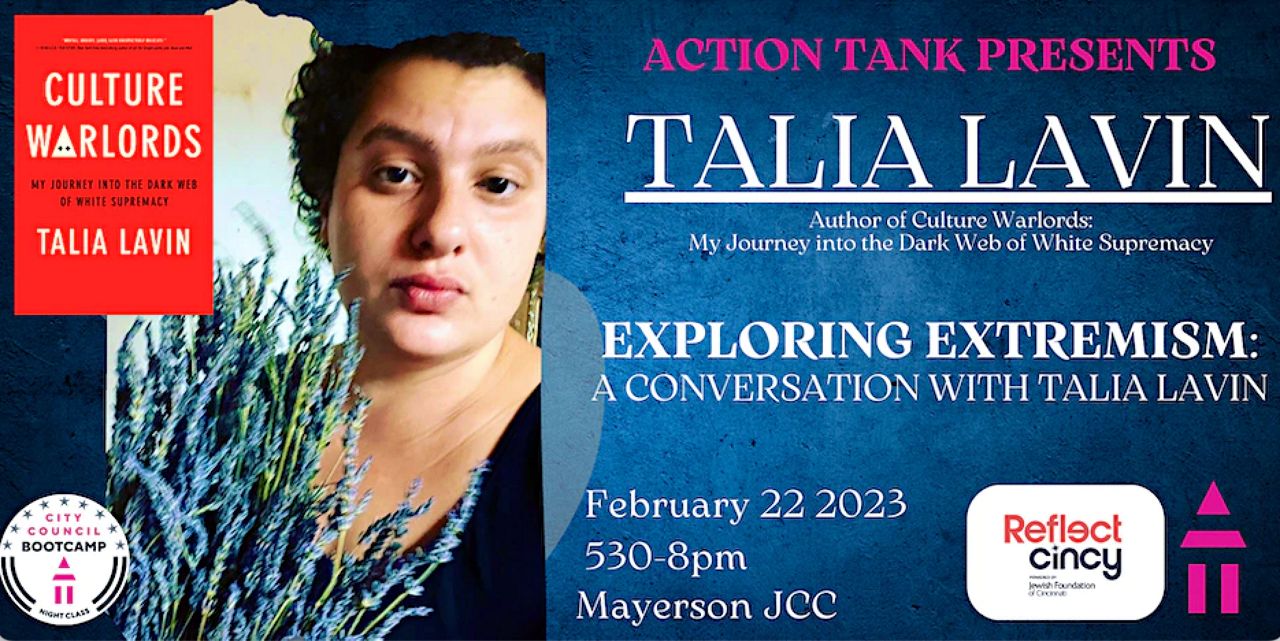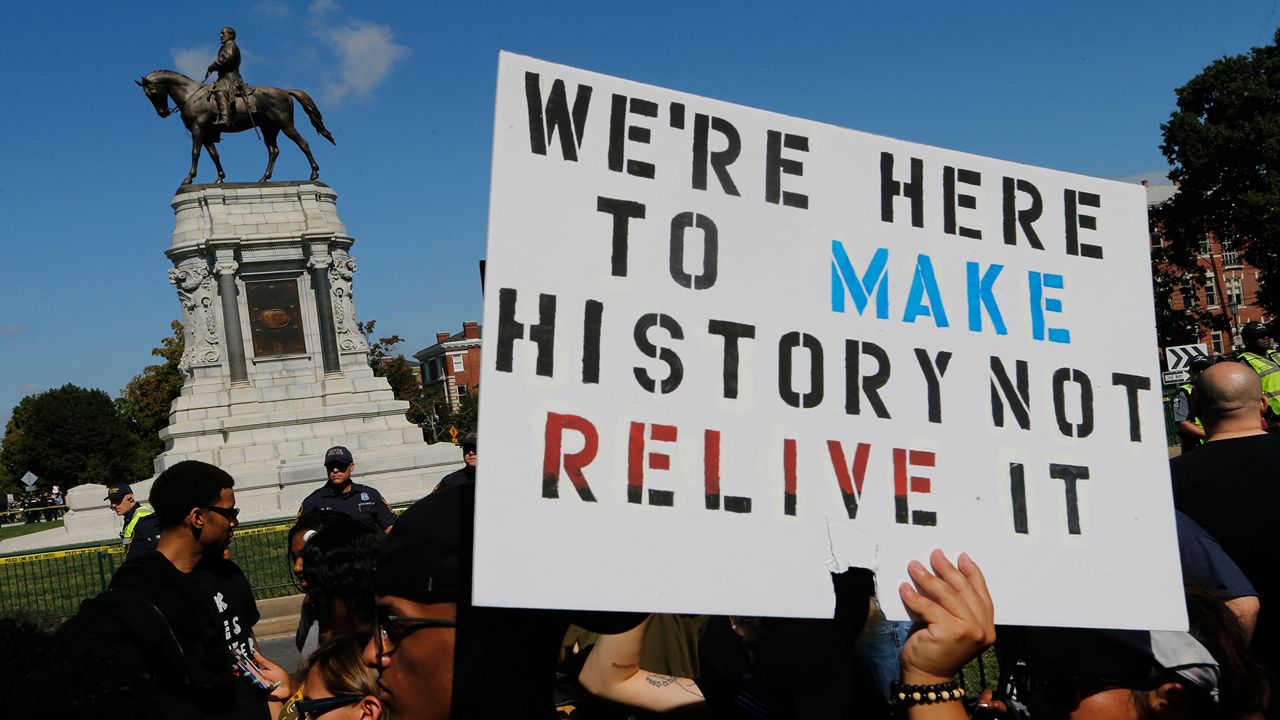CINCINNATI — A new event series looks to arm residents with the tools, resources and confidence to combat acts of political extremism and antisemitism taking place in their own backyards.
The Preventing Political Extremism Project is the brainchild of the team at Action Tank. It’s a Cincinnati-based nonprofit that works with residents and community groups to promote public policy solutions at the local level.
Over the course of its program, the Action Tank team will assemble a Preventing Political Extremism Toolkit, according to Ioanna Paraskevopoulos, the organization’s executive director and co-founder. She said it will feature resources and approaches to support resident-led efforts to identify and tackle political extremism and antisemitism within their families, communities and cities.
As a program kick-off, Action Tank is hosting a moderated lecture and discussion with author and journalist Talia Lavin on Wednesday, Feb. 22 at Mayerson JCC in Amberley Village. The ticketed event takes place from 5:30 to 8 p.m.

Lavin has focused on the American far right since 2017. Her most recent book, “Culture Overlords,” examines the role of social media and the internet in the spread of white supremacy and hate groups.
Since the release of her book, Lavin, who’s Jewish, has traveled around the country talking to different communities about her work and ways to oppose it.
The moderator is Kevin Aldridge, an Ohio native and opinion and engagement editor for the Cincinnati Enquirer, a Spectrum News partner.
“We want to introduce the project and start exploring what extremism is and how it shows up for folks in daily life,” Paraskevopoulos said. “We hope Talia’s insights inspire participants to think more deeply about how extremism shows up locally here and how we anticipate that might show up in the next few years.”
The timing of the program comes when the country is experiencing a radical uptick in cases of extremism, especially among those in the Jewish community.
In 2021, there were 2,717 antisemitic incidents throughout the United States, according to data from the Anti-Defamation League (ADL) Center on Extremism.
That figure was a 34% increase from 2020. It’s also the highest number on record since ADL began tracking antisemitic incidents in 1979.
The ADL tracks incidents of antisemitic harassment, vandalism and assault. None of the 131 assault victims last year died from their injuries, per ADL data.
Over the weekend, an unidentified person threw a Molotov cocktail at a New Jersey synagogue. The incident caused minor damage to the place of worship, but the action shook the Jewish community in Bloomfield Township where it happened, NPR reported.
“We’re seeing more antisemitism than we have in more than 40 years — the highest number of incidents ever on record,” said Jackie Congedo, with the Nancy & David Wolf Holocaust & Humanity Center in Cincinnati.
That’s a problem for Jewish people, but she emphasized hatred against one group of people represents bigger issues for the entire country.
“Because it functions as a conspiracy theory, antisemitism rising is a warning sign of cracks in the fabric of our civil society,” Congedo said. “It’s also inherently connected to other forms of marginalization and hate. The first step in addressing all of this is to understand how to spot it and respond.”
All forms of hate — whether it’s transphobia, anti-Black racism, antisemitism, homophobia or misogyny — are “deeply interconnected,” Lavin said. She noted those all originate from a distorted worldview that “fundamentally views social change deliberately orchestrated to harm” another group, namely white people.
“You really can’t combat one form of hatred in isolation because they operate as a linked network,” Lavin added.
Lavin’s last book focused on overt, self-identified hate groups like neo-Nazis. In her upcoming work, she’s exploring what she called “that mainstream stuff.” Those are less obvious methods that aim to “uphold systems of white supremacy and hatred” in the guise of things such as religion or traditional values.
“They’re all a kind of product that can be sold to a willing audience with the idea that it will somehow hurt or harm people from disfavored groups,” she added.
Lavin described the pandemic as a mass radicalization event. Ideas or actions that were once the provenance of the “right-wing fringe” are more prominent today in various segments of society, “even in the halls of Congress.”
She compared the past few years of studying hate groups and antisemitism to watching a cancer metastasize and spread.
“The American body politic today is just absolutely riddled with the cancer of bigotry,” she said.
A lot of what Lavin talks about is the importance of direct action and “unashamed confrontation with hatred in your communities. Most portrayals of this type of activism are “street marches or getting dressed all in black,” she added, but she emphasized there are other approaches that often go undiscussed.
Lavin said she looks forward to discussing some of the different approaches with the greater Cincinnati crowd.
Dr. Matthew Kraus, head of the Department of Judaic Studies at the University of Cincinnati, believes that extremism and antisemitism depend upon “naïve, unexamined, one-dimensional, and zero-sum worldviews."
Kraus isn’t affiliated with the Action Tank program, but emphasized the key role providing a platform for “honest understanding of our world and encounters with others and their views” can play in addressing that kind of hate.
“(They) facilitate effective and just solutions rather than unhealthy fast food answers to gourmet problems,” he added.
Action Tank plans for this Preventing Political Extremism Project event to have a hybrid-style set up with people being able to take part in person or online. Lavin plans to talk and answer questions virtually for about two-and-a-half hours.
Tickets are pay-what-you-can with a suggested donation, Paraskevopoulos said.
Action Tank is offering a free kosher dinner and child care to anyone registered by Wednesday, Feb. 1.
Besides the lecture, Action Tank is scheduling a series of pop-up community engagement events. Those won’t have lectures, though, Paraskevopoulos said.
During each event, the Action Tank team will collect feedback from participants for the toolkit. They’ll also turn to local and national experts in areas such as extremism, policy and civic engagement for input on the guide, Paraskevopoulos said.
Plans are to release it in the late summer 2023 as part of a broad roll-out strategy, Paraskevopoulos said.
“We want to help residents identify and push back against extremism at the local level,” she added.



